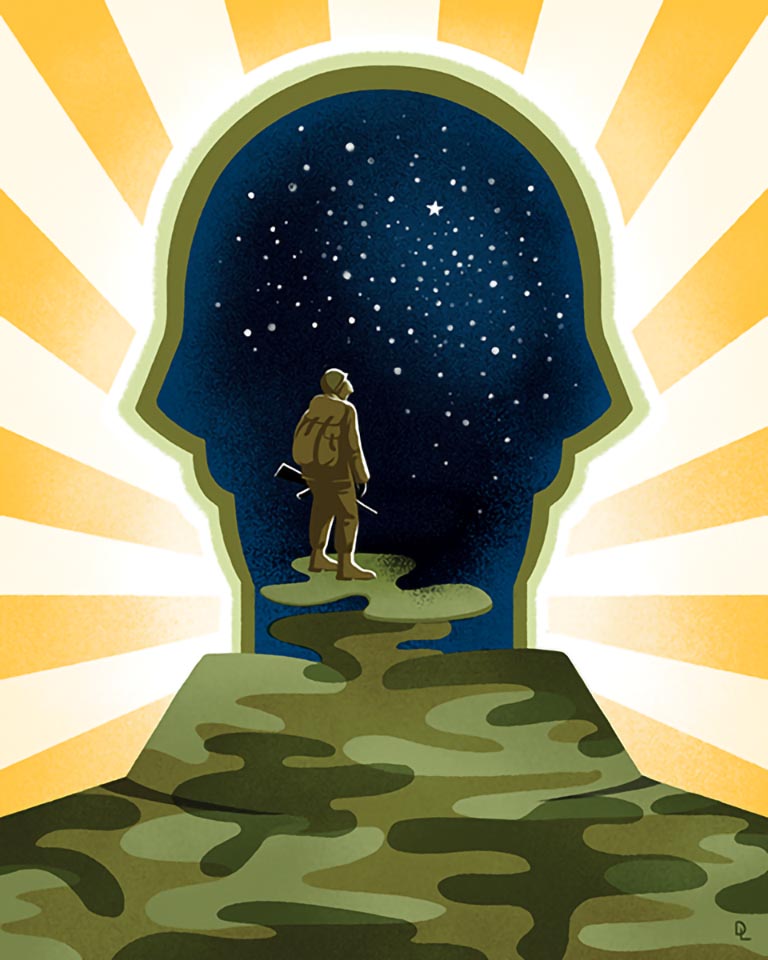PTSD research finds that the way veterans tell their own stories predicts their mental health.
When Peter Tappenden ’18 arrived on campus in the fall of his senior year, he knew exactly what he wanted to study for his honors thesis in psychology. He’d spent the summer in Boston, working at an outpatient program for veterans with post-traumatic stress disorder (PTSD). He was excited to learn more about the factors that make some people vulnerable to PTSD after experiencing trauma, while others are more resilient to the condition.
The only hitch was that Tappenden’s adviser, Rebecca Shiner, had done extensive research on personality development but had never worked on PTSD.
Undaunted, the pair sat down to brainstorm. “I wanted to try to find a way to support his interest in that topic,” says Shiner, who is the Charles A. Dana Professor of psychological and brain sciences. “I’m always game to learn about something new.”
She proposed that they merge Tappenden’s interest in PTSD with a new interest of her own. She’d been learning about a field called narrative identity. It’s “the study of the way people tell the stories of their lives,” Shiner explains. The research appealed to her, “because I have a strong attraction to the humanities,” she adds. Studies have shown that the style in which people describe their experiences is an important aspect of personality and may be related to mental health.
Tappenden and Shiner recruited 154 veterans to complete an online survey. They gave the study participants two writing prompts. The first was to describe a “highly stressful” event from their military experience. The second was to describe a “key scene” that didn’t have to be stressful. Participants also answered questions that assessed their overall well-being and symptoms of mental illnesses such as depression and PTSD.
Tappenden worked with co-author Fanyi Mo ’20 to comb through all the narratives and score them for different variables. They found two factors that correlated with the veterans’ current mental health: agency and personal growth. The people whose stories about a highly stressful experience demonstrated a sense of control in their lives, and who expressed ways they had grown through their ordeal, had better mental health.
But the researchers didn’t see the same connection in the nonstressful “key scenes” that veterans described. “There’s something important about reflecting back on these highly stressful events, specifically,” Shiner says.
The results suggest that veterans who can draw meaning from potentially traumatic experiences in the past are mentally better off today. Shiner says the findings lined up with what other narrative identity studies have shown.
“As a first step, I think the results are really interesting and important,” Shiner says. The group published their findings in 2021 in the Journal of Traumatic Stress. She hopes there will be further studies of narrative identity in veterans that tease out the factors that might make some people more vulnerable to PTSD.
Tappenden is now in graduate school at Northern Illinois University, studying PTSD in first responders. During the COVID-19 pandemic, he says, there’s been “almost an unprecedented level of distress placed on those populations.”
He hopes to one day work with patients with PTSD, while continuing to research ways to improve their care. With the veteran study, Tappenden says, he was struck by just how long the effects of trauma can reverberate. Many of the vets in his sample had served in Vietnam, as long as half a century ago. “And still, the way that they reflect back on these highly stressful events from their service was important for their present functioning,” he says.
After dipping her toe into the field of narrative identity, “I now really love this line of research,” Shiner says. In an ongoing study, she’s looking at the narratives of a group of Colgate students. She started gathering data on the students’ personalities before the pandemic, and now the students have written twice about scenes from their lives during the COVID-19 pandemic. Shiner hopes analyzing these stories will reveal something about whether the students’ styles of narration affect how well they
are coping.
“The stories themselves are often so engaging,” Shiner says. “There’s something very special about doing this kind of research in psychology, because it’s very close to the lived experience of the person.”

